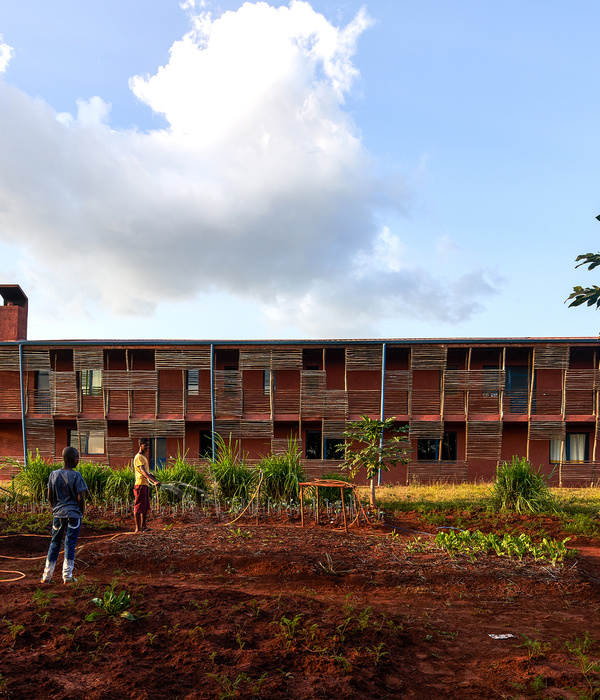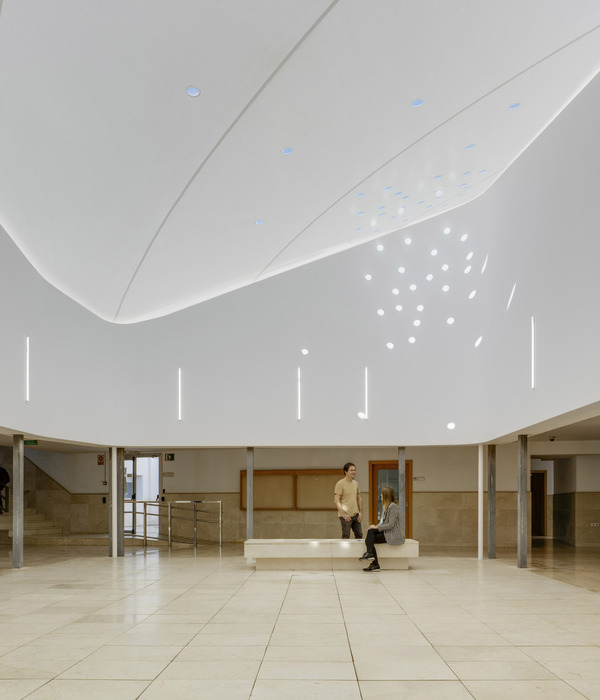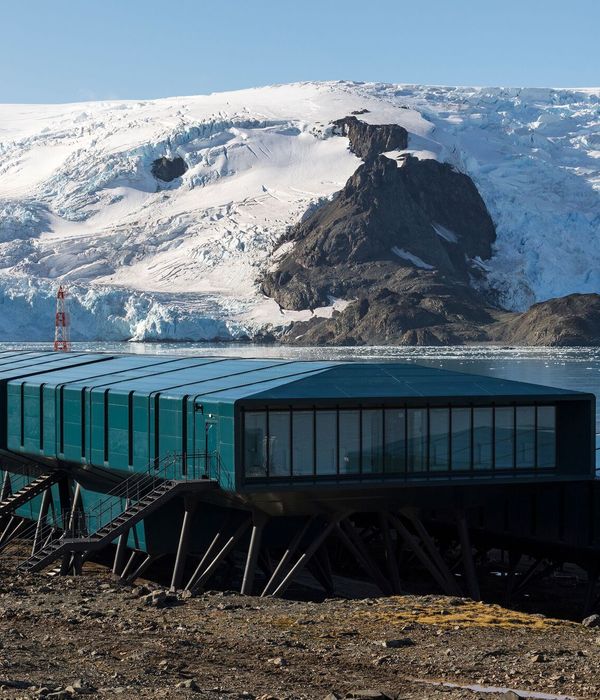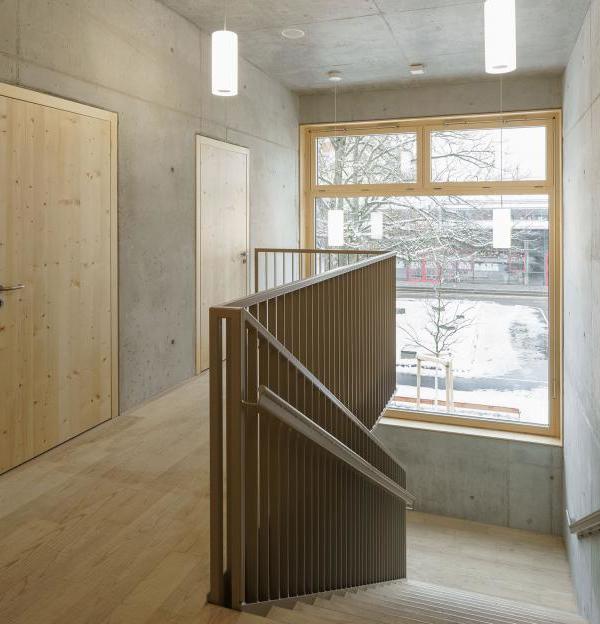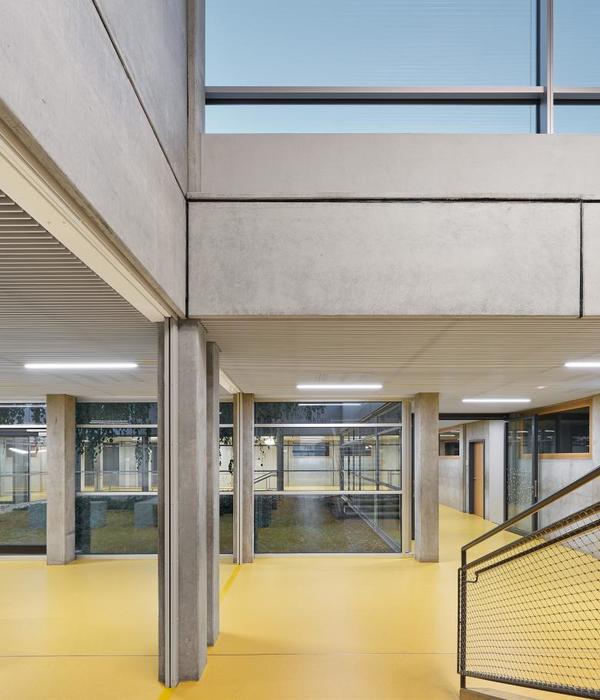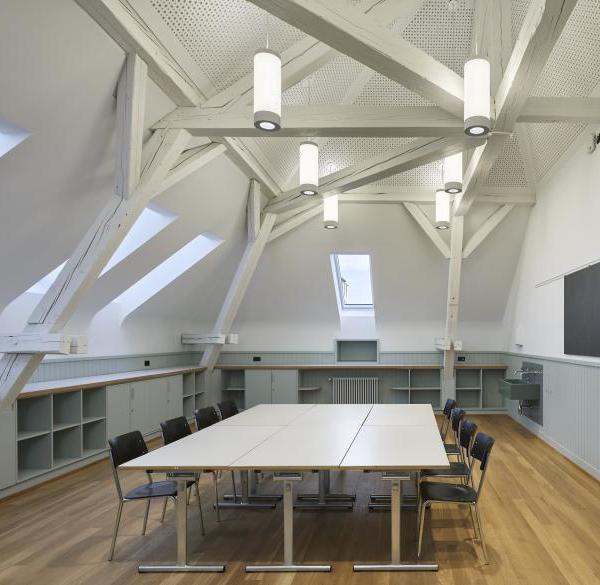- 项目名称:重庆市南开两江学校
- 项目类型:教育建筑
- 设计时间:2016-2017
- 建成时间:2018.9
- 项目规模:10.9万方
- 设计单位:gad
- 项目总监:朱秋龙
- 项目主创:吴彦,郭彧,曹远行,曾思源,甘露,康宁,郭鑫,唐凯,卢震,邢相鹏
- 给排水:崔俊芳,周逢源,李稹,赵丹,刘海滨,蒋云龙
- 暖通:刘元坤,张小峰,万鲁春,夏继东,刘争光,刘树峰
- 电气:周林,穆卫浩,冯龙生,隋媛媛,周兴悦,王煜团
- 施工图设计:中机中联工程有限公司
- 业主:重庆两江新区新南教育信息咨询服务有限公司
- 摄影:shiromio studio,黄金荣,杨光坤
- 结构手法:主体钢结构
在重庆山城,有这样一所中学,将个性化的教育思考融于校园环境,就像是凭空降落在地球的飞船,冲突与包容的特质恰如其分的融合,让人不免发想,在传统的教育空间之外,是否有颠覆已知的可能性。
In the mountain city of Chongqing, there is such a middle school that integrates individualized educational thinking into the campus environment. It is like a spaceship that landed on the earth out of nowhere. The conflicting and inclusive traits are just rightly integrated, which makes you wonder whether there a possibility to subvert the known outside the traditional educational space.
▼项目鸟瞰,aerial view ©范翌
重庆南开中学两江校区坐落于重庆市两江新区龙兴开发区,踏入校园,随之感受到其跳脱传统的空间塑造。得益于校方对设计想法的极大包容,在有限的场地之下如何发挥设计的巧思,实现功能最大化的同时,提升空间使用效率与丰富校园生活,则是作为本次设计的切入点。
Chongqing Nankai LiangJiang Secondary School is located in Longxing Development Zone, Liangjiang New District, Chongqing City. When you enter the campus, you will feel its unconventional space shaping. Thanks to the School’s great tolerance of the design ideas, it is the entry point for the design to give full play to the design ingenuity within a limited venue and achieve maximized functions, while improving the space efficiency and enriching campus life.
▼校园概览,project overview ©黄金荣
▼校园入口,entrnace ©黄金荣
▼高低起伏的外庭院,outer courtyard ©范翌
本部的校园教学楼呈现围绕操场布局的状态,经推敲得出这种布局之下的校园空间尺度更为充裕,设计之中也在延续南开中学本部的空间逻辑。然而基地范围内,高差、噪音、用地范围均构成了设计的限制因素。在综合考虑空间效率的同时,南开中学校园文化中开放、进取的精神也无一不在影响着对中学设计的考量。
▼校园区位总图,general campus location map
The teaching buildings of the headquarters campus present a layout of encompassing the library. It is speculated that the campus space scale of such a layout is more abundant, so the current design also follows the spatial logic of the headquarters campus of Chongqing Nankai Middle School. However, within the base area, the height difference, noise, and land use range constitute the design constraints. Not only the space efficiency is taken into consideration, the spirit of openness and enterprising in the campus culture of Chongqing Nankai Middle School also affects the consideration of the design of the Secondary School.
▼环形校园外观,exterior view of the circular campus ©黄金荣
▼立面细部,facade details ©杨光坤
中学的课程安排通常是紧密的,对于学生和老师来说,空间的高效性与他们息息相关,在短短的10分钟下课时间内,他们需要短暂休息和为下一堂课做准备。为实现高效的转课路线,外环教室之间采用连续清晰的交通流线,内环教室的路线则相对自由模糊,使得高效与趣味在空间行走中切换自如。传统的校园中,自然与教育像是两个独立的系统,天然的被阻隔,而建筑师希望将自然引入校园。环形教学楼外是如同森林的状态,隔离城市的喧嚣,环内设置中心花园,叠落起伏,同时充分确保内外的通透与关联。
▼交通流线分析,analysis of the traffic streamlines
▼平面功能分布,plane functions distribution
The curriculum schedule in secondary schools is commonly intense. For students and teachers, the efficiency of the space is closely related to them. In the only 10-minute break time, they need to have a short break and prepare for the next class. In order to achieve an efficient class transfer route, a continuous and clear traffic streamline is adopted for the outer ring of classrooms, while the route of the inner ring of classrooms is relatively free and blurred, making walking in the space full of efficiency and fun. In traditional campuses, nature and education are like two separate systems that are naturally blocked, so the architects want to introduce nature into the campus. Outside the annulus teaching buildings, there presents forest state, which separates the hustle and bustle of the city. A central garden is set up in the inner ring, with overlapping and undulating objects, ensuring the transparency and connection between the inside and outside.
▼环形校园内部错落分布的教室,inner ring of classrooms ©杨光坤
▼教学楼及环形入口,the education building and its entrance ©杨光坤
▼环形教学楼外的水池,pond outside of the circular building ©范翌
沿外环和内环分布着大小不等的教学空间,环形外圈的教室在流线上更强调效率,内部一般是活动性比较强的选修课教室,自由错落分布。环形建筑之外,学生生活楼房在平面上与其如“10”字构成。这样的安排方式,实则是为了方便功能、流线的划分,在有限的场地下,充分的容纳必要功能,避免造成流线的交错影响。环形内外,森林与峡谷仿佛仅一线之隔,清晰界定。
▼校园轴侧图,isometric view of the campus
Along the outer ring and the inner ring, there are different teaching spaces of different sizes. The outer ring of classrooms emphasize efficiency on the streamline. The inner ring of classrooms are generally those for elective courses that are more active, which are freely distributed. Beyond the annulus buildings, there is the students’ accommodation building that forms a “10” shape with the teaching buildings in the plane view. The arrangement is actually to facilitate the division of functions and streamlines, to fully accommodates the necessary functions within the limited land area, and to avoid the staggered influence of streamlines. The forest and the canyon inside and outside the ring seem to be clearly separated by a line.
▼教学楼楼梯,staircase ©范翌
▼教学楼内部庭院,inner courtyard ©范翌
动静有致的校园,成为课间10分钟的活力催化剂。内庭院犹如峡谷般的高低起伏,学术报告厅和礼堂则顺势而建,场地中不乏生态气息,内圈模数化顶棚为场地带来了必要的光线控制,整体立面则采用竖向格栅遮挡黑板区直射光线,这样的方式也为空间加入些许律动。
A campus with orderly arranged static and dynamic spaces will serve as a vitality catalyst for the 10-minute break time between classes. The inner courtyard is full of ups and downs like a canyon. The academic lecture hall and the auditorium are built along the way, where the ecological atmosphere is not scarce. The inner modular ceiling provides the necessary light control for the site, and the vertical facade uses vertical grilles to block the direct light of the blackboard area, which also adds some rhythm to the space.
▼内圈模数化顶棚为场地带来了必要的光线控制,the inner modular ceiling provides the necessary light control for the site ©杨光坤
课堂之外,原本安静的校园即刻焕发活力,学校内设有足球场、篮球场等体育场地,环形建筑的楼顶同样也是一条628米长的慢步道,少年们在收获知识的同时,身体、个性、思想也得以塑造成长。
▼局部放大轴侧图,locally enlarged isometric view
After class, the originally quiet campus is instantly rejuvenated. There is a football field, a basketball court and other sports venues in the School. The rooftop of the annulus buildings is also a 628-meter-long footpath, allowing the teenagers to shape and grow their body, personality and thoughts at the same time of gaining knowledge.
▼屋顶跑道,rooftop path ©范翌
除此之外,庭院内还分布诸多“模糊空间”,设计师在完善教学功能、课下生活场景及景观空间的考量之外,特意将一些场所留白,等待使用者去发现和激活,创造未知的活力据点。
Furthermore, there are many “fuzzy spaces” in the courtyard. In addition to the consideration of teaching functions, life scenarios and landscape space, the designers deliberately leave some places blank, allowing users to discover and activate them, creating the unknown vitality sites.
▼庭院内的“模糊空间”,many “fuzzy spaces” in the courtyard ©黄金荣
▼课下生活场景及景观空间,life scenarios and landscape space ©黄金荣
▼场所留白等待使用者去发现和激活,blank places allowing users to discover and activate them ©黄金荣
▼创造未知的活力据点,creating the unknown vitality sites ©黄金荣
著名教育家蔡元培曾说:“教育者,非为已往,非为现在,而专为将来”,希望少年们在接受教育收获知识之外,能够延续南开中学的精神,一步步开拓人生,践行未来。
Cai Yuanpei, a well-known educator, once said: “Educators are not for the past, nor for the present, but for the future”. The teenagers are expected to continue the spirit of Chongqing Nankai Middle School in addition to gaining the taught knowledge, and gradually develop their lives and practice in the future.
▼内庭院夜景,night view of the inner courtyard ©范翌
▼外庭院夜景,night view of the outer courtyard ©范翌
▼总平面图,master plan
项目名称:重庆市南开两江学校 项目地点:重庆市 详细地址:两江新区龙兴镇渝江大道209号 项目类型:教育建筑 设计时间:2016-2017 建成时间:2018.9 项目规模:10.9万方 设计单位:gad 项目总监:朱秋龙 项目主创:吴彦,郭彧,曹远行,曾思源,甘露,康宁,郭鑫,唐凯,卢震,邢相鹏 完整团队成员 建筑:朱秋龙,吴彦,郭鑫,余杨,郭彧,曹远行,曾思源,甘露,康宁,王灵艳,李琳,卢震,唐凯,邢相鹏,杨建伟,张路,李敏 结构:于涛,吕晓东,单志伟,黄嘉,周波,舒启军,时吉涛,李涛,王莲花,王传坤,王华强,裴长岭,刘海洋 给排水:崔俊芳,周逢源,李稹,赵丹,刘海滨,蒋云龙 暖通:刘元坤,张小峰,万鲁春,夏继东,刘争光,刘树峰 电气:周林,穆卫浩,冯龙生,隋媛媛,周兴悦,王煜团 其他参与者 施工图设计:中机中联工程有限公司 业主:重庆两江新区新南教育信息咨询服务有限公司 摄影:shiromio studio,黄金荣,杨光坤 结构手法:主体钢结构
Project Name: Chongqing Nankai Liang Jiang Secondary School Project Location: Chongqing Address: Liang Jiang New District Project Type: Educational Building Design Time: from 2016 to 2017 Completion Time: September, 2018 Project Size: 109,000 square meters Design Unit: gad Project Director: Qiulong Zhu Project Principal Designers: Yan Wu, Yu Guo, Yuanxing Cao, Siyuan Zeng, Lu Gan, Ning Kang, Xin Guo, Kai Tang, Zhen Lu, and Xiangpeng Xing All Team Members Architecture: Qiulong Zhu, Yan Wu, Xin Guo, Yang Yu, Yu Guo, Yuanxing Cao, Siyuan Zeng, Lu Gan, Ning Kang, Lingyan Wang, Lin Li, Zhen Lu, Kai Tang, Xiangpeng Xing, Jianwei Yang, Lu Zhang, Min Li Structure: Tao Yu, Xiaodong Lv, Zhiwei Dan, Jia Huang, Bo Zhou, Qijun Shu, Jitao Shi, Tao Li, Lianhua Wang, Chuankun Wang, Huaqiang Wang, Changling Pei, Haiyang Liu Water Supply and Drainage: Junfang Cui, Fengyuan Zhou, Zhen Li, Dan Zhao, Haibin Liu, Yunlong Jiang HVAC: Yuankun Liu, Xiaofeng Zhang, Luchun Wan, Jidong Xia, Zhengguang Liu, Shufeng Liu Electric: Lin Zhou, Weihao Mu, Longsheng Feng, Yuanyuan Sui, Xingyue Zhou, Yutuan Wang Other Participants Construction Drawing : CMCU Engineering Corporation Owner: Chongqing Liang Jiang New District Xinnan Education Information Consulting Service Co., Ltd. Photography: shiromio studio, Jinrong Huang, Guangkun Yang Structural Method: Main steel structure
{{item.text_origin}}


